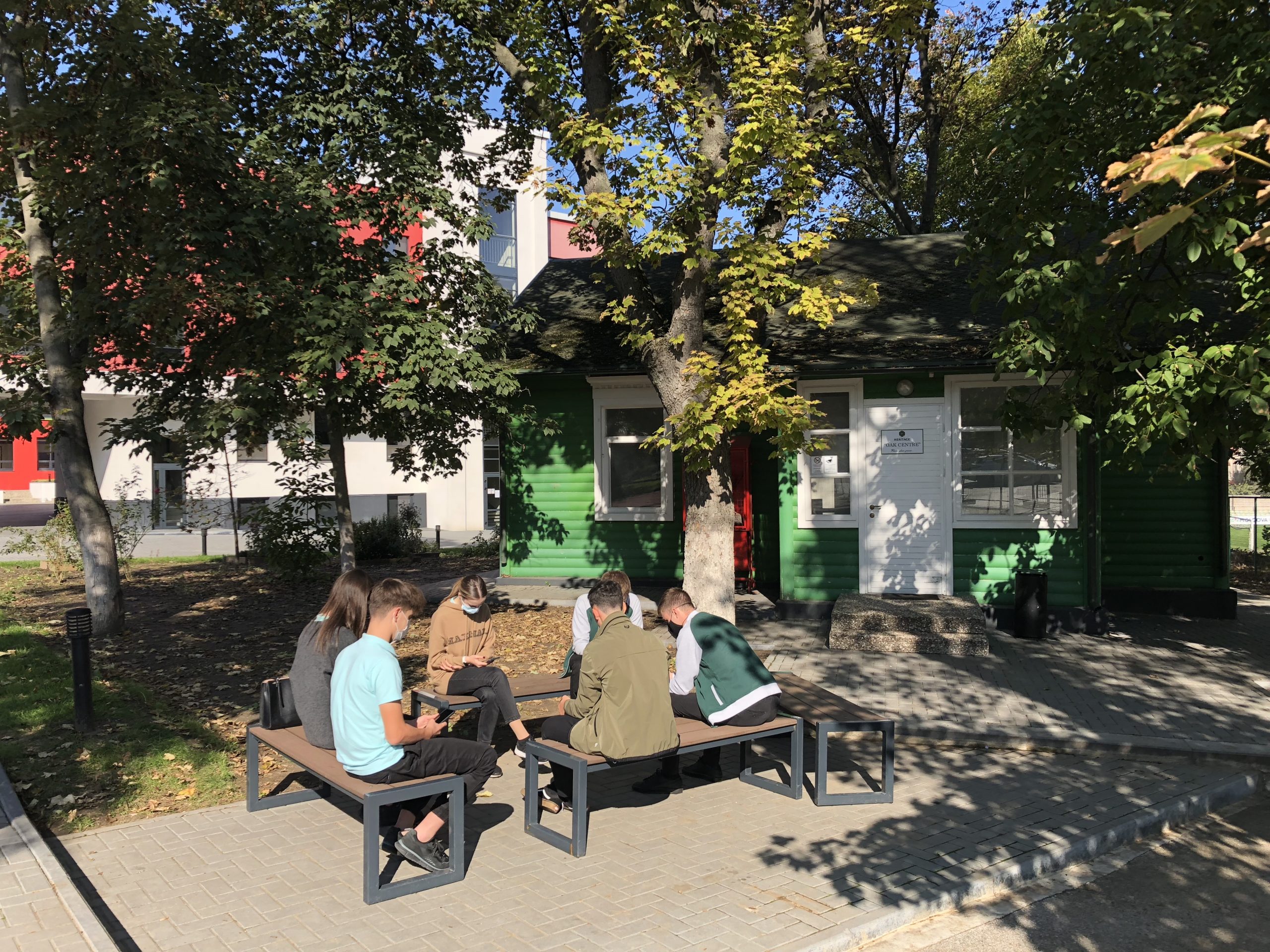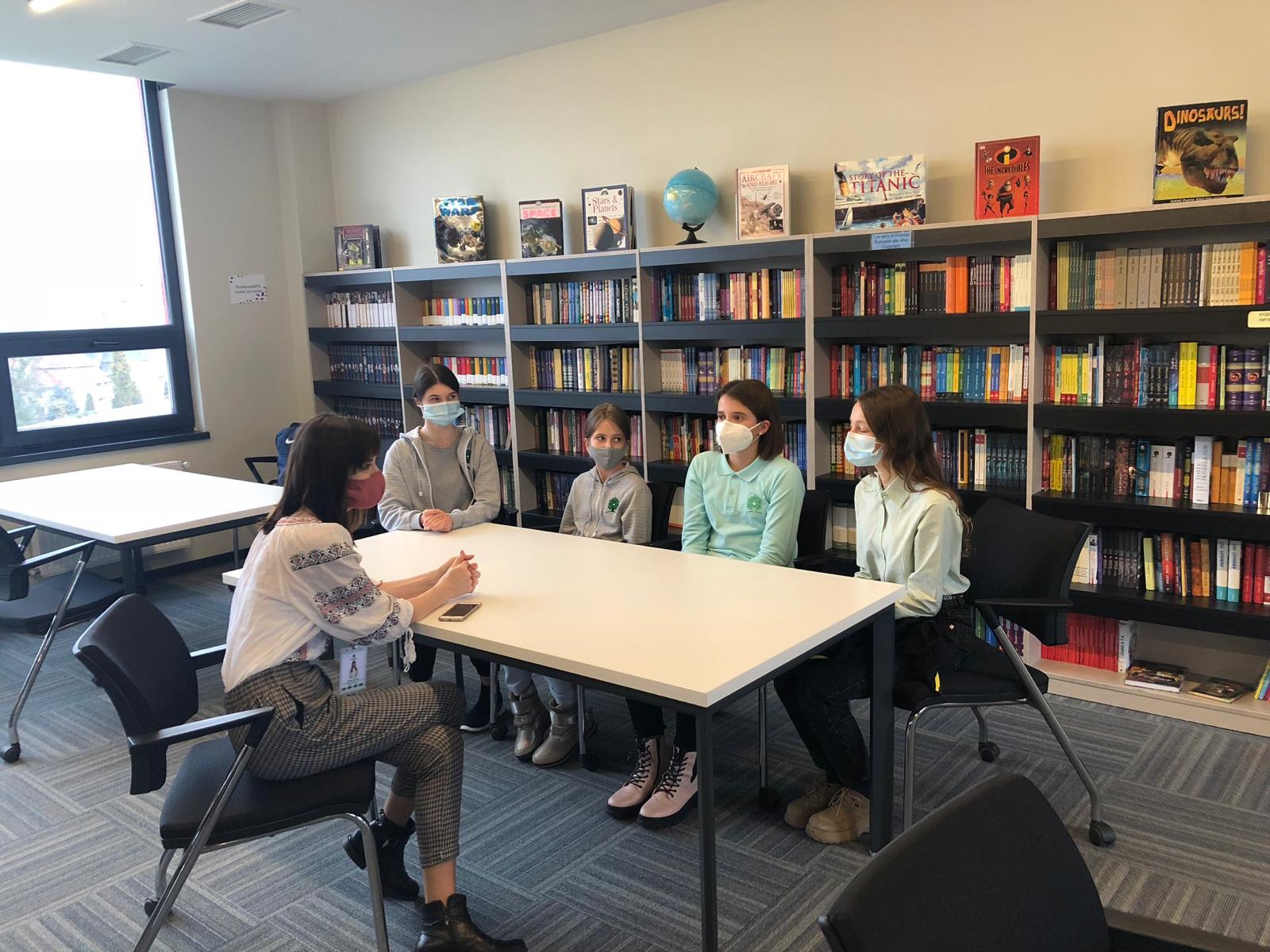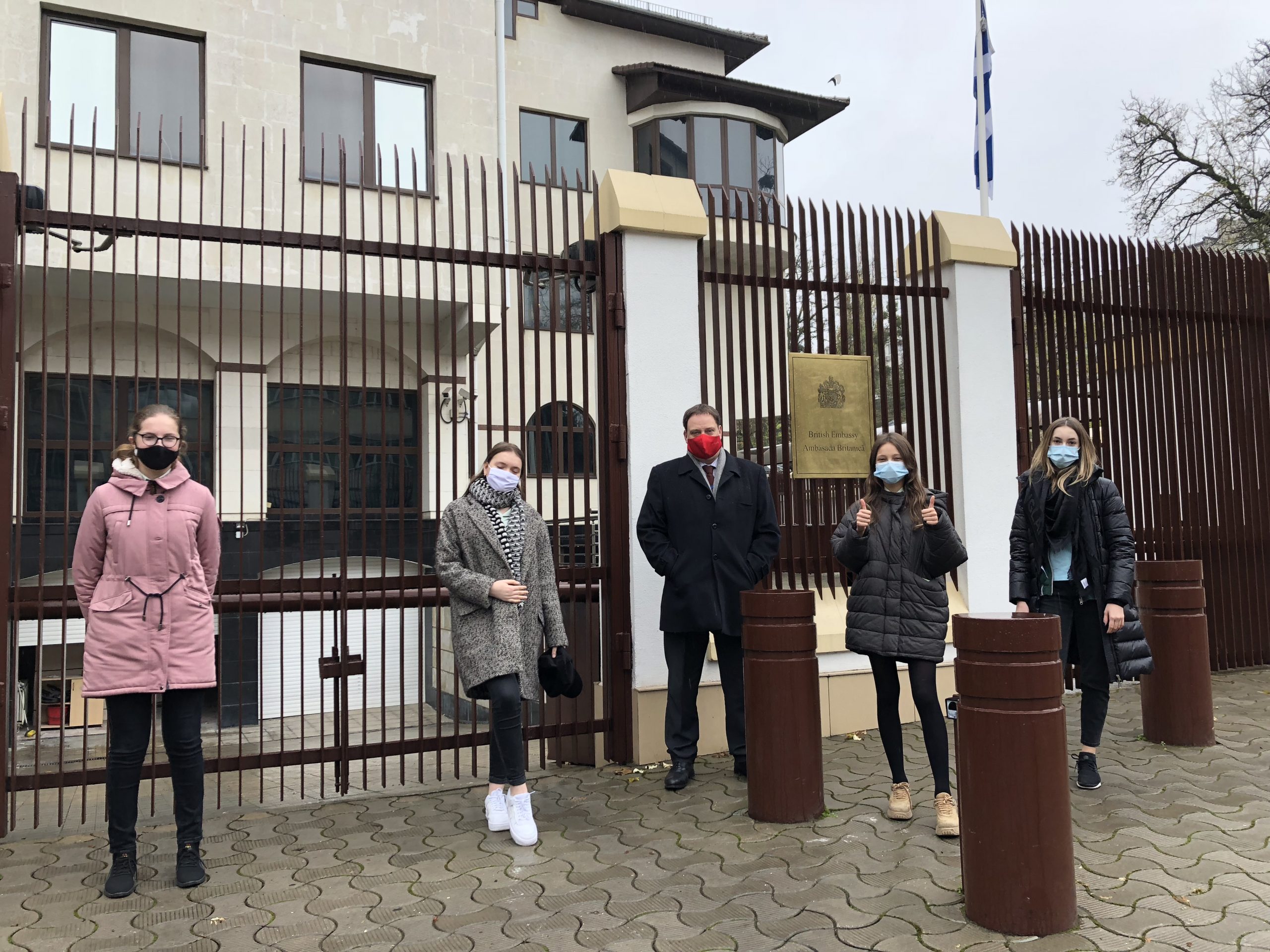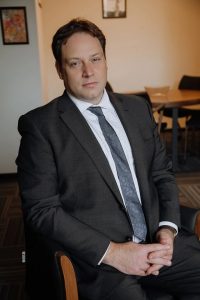Education
Robert Ford, Director of Heritage International School, discusses the new Cambridge pathway Lyceum: “There is nothing like this in Moldova, we are proud to be the first”
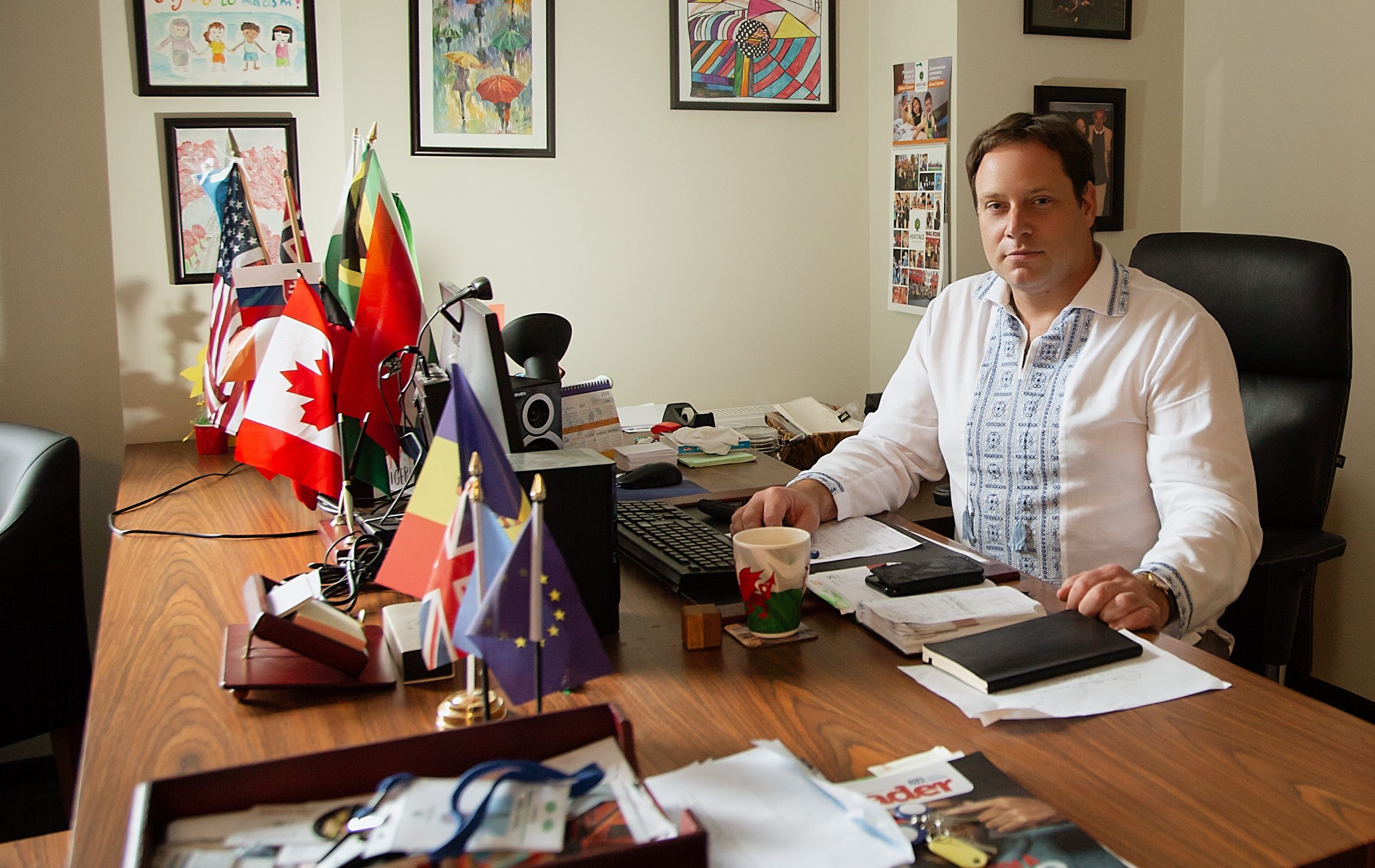
The fourth year of Heritage International School in Moldova has proven to be a challenging one, but also filled with opportunities. One of these opportunities is represented by a premiere for our country – the introduction of A Level, a high-quality lyceum program designed for students between 16 and 18. This is the golden global standard, that would not only replace the Moldovan baccalaureate for the Heritage students, but also open the doors of the most important universities around the world for them. With the recruiting process for the next academic year starting in January, the school’s leadership keeps hopeful, but pragmatic. They continue to work hard for the development of the school and of its students – the future leaders of this world.
We talk about the innovations and the outlook for 2021 with Robert Ford, the Director of Heritage International School.
Looking back at all these months of crisis and the school year, could you talk a bit about some of the positive lessons that you’ve learned?
It has been an extraordinary year. I think education around the world has found itself having to adapt. Every educator is very good at adapting, because that’s what we have to do when lessons don’t go the way we think they’re going to go, and things change, or policies, or exams. But this year has given more opportunities to adapt than normal. And I think that’s the real big lesson. I also feel that we’ve come together as a community, much stronger. I read a really important UNICEF report earlier that was saying we can’t allow education to become a victim of COVID-19.
I work with remarkable people at Heritage International School. So, the big key lessons for me are the way people adapted, but also the resilience and the way they fought to keep education going.
What is the atmosphere and the feeling in the school right now?
Hopeful for 2021. We’re in education, we’re always hopeful for young people and children. And the hope for me means planning this next state of the school, it’s planning all this good educational system. It doesn’t feel like we’re on our knees, far from it. It feels like we’re running towards the end of semester one, all that in the lovely atmosphere of Christmas and children creating things. Happiness and joy are very important parts of daily school life, because we know how tough and worrying the world seems sometimes, especially in this moment.
How does the future and the new school year look like from where you are standing?
It looks really good, because I think I’ve got the most experienced distance learning team, able to deal with crises and being so student-centred! Going forward with that experience and that dedication of teachers, it’s us in Moldova giving an example to the world. I also feel that we’re looking forward with hope and optimism. We’re all planning for 2021 to be similar right up until the end of this academic year and hopeful that by this summer it would be different. So, for me 2021 is continuing all the good work that we’ve done, but with more of a sense that we’re coming to the end part of this crisis, hopefully.
Let’s discuss the upcoming year in more detail now. I know that you have chosen an A Level international curriculum for the Heritage Lyceum. Could you please explain what that means?
One of the parts we’re looking forward to, the next stage of school development comes to play and that’s the lyceum. At Heritage we follow the Cambridge International curriculum, which is a curriculum pathway from primary school all the way up to upper secondary (mixed with the national curriculum), and then takes the students into lyceum. Here they begin Cambridge International A Level, a +16 university access course, the global gold standard – around a third of international schools in the world use A Level. This is like no other pathway to university and doesn’t compare to national lyceum routes in our region. Our students will not go through the national baccalaureate system, they will take the A Level exams and get the globally recognized Cambridge qualifications. Moreover, in the Heritage Lyceum, our medium of instruction is exclusively English, and as the global lingua franca, this already opens up doors for our students to access global universities and careers.
In the A Level curriculum the emphasis is on the intellectual rigour and demand for qualifications that will allow access to the best universities in the world, but it is also a programme that develops the individual ready to make university and life beyond successful and fulfilling. This is an investment in the future and national qualifications rarely focus on the holistic development of students in areas such as independent study, student leadership, wellbeing, critical thinking, deeper knowledge, confidence, resilience and a lifelong love of learning. A Level allows the students to effectively finish their journey as global citizens up to the age of 18 and it gives them global mobility – the opportunity to study abroad.
Very importantly, our teachers are recruited for their commitment to an outward facing 21st century school curriculum and culture and are all highly qualified and certified under Cambridge International Assessment. We are a Cambridge professional development centre and we are piloting Cambridge initiatives. I have recently contributed an article for their case studies showing the successful strategy of Heritage in the pandemic.
It is known that at Heritage the program around the curriculum and the enrichment activities are as important as the academics. Tell us more.
Here’s an example that is already a part of the Cambridge pathway – our Founders’ Lecture Series. This term alone we had three amazing speakers, someone working in humanitarian aid who was literally flying to Honduras the next day – and that was very powerful! Next week we’ve actually got the Irish Ambassador in Moldova who’s going to talk about the success of small nations, the economic success of Ireland and how the diaspora can contribute. I think that for Moldova that’s such a brilliant example. In February, we are deeply honoured to have Baroness Royall, the principal of Somerville College, University of Oxford, the former college of Margaret Thatcher, for a guest lecture, and she will be speaking to our students of her career in Europe, as Leader of the House of Lords and principal of the college that produced the UK’s first female prime minister and now the pioneer of the Oxford coronavirus vaccine. Incredible learning opportunities for our students to access as a normal part of their education.
What I am really looking forward to with Heritage is, one day, very soon, the children in grade 10 now, will come back and they will be an authentic example and the proof that this education is so much bigger than your individual self. This is what we are crafting here in the school.
Let’s talk about the admission process, for parents and students wishing to join Heritage, where should they start?
Our social media is really prolific, they can find us on Twitter, Facebook, Instagram. But they should start on our website, our admission process is very clear there. We have admission officers: English, Russian and Romanian speaking. We want students that have studied in Moldova, not necessarily all from this school.
For the Heritage Lyceum most of our students in grade 10 want to come back into our A Level and those that don’t are going abroad, so we’re really happy that this program appeals to them.
The application process would run technically until September, but the real window of opportunity for students is the end of January, February and no later than March.
A part of that process is that we interview students. Now we know that not all of them will have IGCSE (International General Certificate of Secondary Education), but the Ministry has got equivalency of what the Moldovan qualifications means in comparison with the IGCSE qualification. So, there is no issue there that we would turn students away because it’s a Cambridge pathway. It might mean that there’s a summer catch-up for some students, but I have to say that students that have joined us from outside are so hard working and so eager that actually they are at the same level almost from the beginning.
As a director, I’m closely involved in this process because of my experience of running a huge lyceum of 400 A Level students. And I know, working with 16-year olds, that often they don’t see quite far ahead into their future or their parents might have a very determined idea about what their future should be. But once we do a very personalised interview and help the students with their career guidance, we can make sure they are on the right pathways.
We live in times of change and Heritage International School is changing as well, with the introduction of A Level, for example. What are your hopes for the future regarding these changes?
There is nothing like this in Moldova, we’re really proud to be the first. It’s exciting, and it’s historic, and it’s a huge duty for us to get this right. And we hope this is something that Moldova will be proud of, not just the families of Heritage, but the whole country. We know that education is not the unique gift of one group, that we all benefit when we collaborate.
There is so much information out there, but turning that into knowledge and wisdom is still the key of education. So that’s why schools are so important, as well as adding that thread that runs through from young people to old people is really important as well. We see generational and gender shifts in leadership around the world. We see that in Kamala Harris as vice-president elect in the States, we see that in Maia Sandu, we see that in European leaders and in Asian leaders. And this is where we are planning and preparing this future generation in their roles as our future leadership. And this is allowing them to have the necessary skills to run things much more successfully than the previous generations have. That’s my hope as an educator.
We are at your disposal for any information about the admission to the Heritage High School at +37362022210 and [email protected].
Society
“They are not needy, but they need help”. How Moldovan volunteers try to create a safe environment for the Ukrainian refugees

At the Government’s ground floor, the phones ring constantly, the laptop screens never reach standby. In one corner of the room there is a logistics planning meeting, someone has a call on Zoom with partners and donors, someone else finally managed to take a cookie and make some coffee. Everyone is exhausted and have sleepy red eyes, but the volunteers still have a lot of energy and dedication to help in creating a safe place for the Ukrainian refugees.
“It’s like a continuous bustle just so you won’t read the news. You get home sometimes and you don’t have time for news, and that somehow helps. It’s a kind of solidarity and mutual support,” says Vlada Ciobanu, volunteer responsible for communication and fundraising.
The volunteers group was formed from the very first day of war. A Facebook page was created, where all types of messages immediately started to flow: “I offer accommodation”, “I want to help”, “I want to get involved”, “Where can I bring the products?”, “I have a car and I can go to the customs”. Soon, the authorities also started asking for volunteers’ support. Now they all work together, coordinate activities and try to find solutions to the most difficult problems.
Is accommodation needed for 10, 200 or 800 people? Do you need transportation to the customs? Does anyone want to deliver 3 tons of apples and does not know where? Do you need medicine or mobile toilets? All these questions require prompt answers and actions. Blankets, sheets, diapers, hygiene products, food, clothes – people bring everything, and someone needs to quickly find ways of delivering them to those who need them.
Sometimes this collaboration is difficult, involves a lot of bureaucracy, and it can be difficult to get answers on time. “Republic of Moldova has never faced such a large influx of refugees and, probably because nobody thought this could happen, a mechanism of this kind of crisis has not been developed. Due to the absence of such a mechanism that the state should have created, we, the volunteers, intervened and tried to help in a practical way for the spontaneous and on the sport solutions of the problems,” mentions Ecaterina Luțișina, volunteer responsible for the refugees’ accommodation.
Ana Maria Popa, one of the founders of the group “Help Ukrainians in Moldova/SOS Українці Молдовa” says that the toughest thing is to find time and have a clear mind in managing different procedures, although things still happen somehow naturally. Everyone is ready to intervene and help, to take on more responsibilities and to act immediately when needed. The biggest challenges arise when it is necessary to accommodate large families, people with special needs, for which alternative solutions must be identified.
Goods and donations
The volunteers try to cope with the high flow of requests for both accommodation and products of all kinds. “It came to me as a shock and a panic when I found out that both mothers who are now in Ukraine, as well as those who found refuge in our country are losing their milk because of stress. We are trying to fill an enormous need for milk powder, for which the demand is high and the stocks are decreasing”, says Steliana, the volunteer responsible for the distribution of goods from the donation centers.
Several centers have been set up to collect donations in all regions of Chisinau, and volunteers are redirecting the goods to where the refugees are. A system for processing and monitoring donations has already been established, while the volunteer drivers take over the order only according to a unique code.
Volunteers from the collection centers also do the inventory – the donated goods and the distributed goods. The rest is transported to Vatra deposit, from where it is distributed to the placement centers where more than 50 refugees are housed.
When they want to donate goods, but they don’t know what would be needed, people are urged to put themselves in the position of refugees and ask themselves what would they need most if they wake up overnight and have to hurriedly pack their bags and run away. Steliana wants to emphasise that “these people are not needy, but these people need help. They did not choose to end up in this situation.”
Furthermore, the volunteer Cristina Sîrbu seeks to identify producers and negotiate prices for products needed by refugees, thus mediating the procurement process for NGOs with which she collaborates, such as Caritas, World Children’s Fund, Polish Solidarity Fund, Lifting hands, Peace Corps and others.
One of the challenges she is facing now is the identifying a mattress manufacturer in the West, because the Moldovan mattress manufacturer that has been helping so far no longer has polyurethane, a raw material usually imported from Russia and Ukraine.
Cristina also needs to find solutions for the needs of the volunteer groups – phones, laptops, gsm connection and internet for a good carrying out of activities.
Hate messages
The most difficult thing for the communication team is to manage the hate messages on the social networks, which started to appear more often. “Even if there is some sort of dissatisfaction from the Ukrainian refugees and those who offer help, we live now in a very diverse society, there are different kind of people, and we act very differently under stress,” said Vlada Ciobanu.
Translation by Cătălina Bîrsanu
Important
#WorldForUkraine – a map that shows the magnitude of the world’s actions against Russian aggression

The international community and volunteers from all over te world have launched #WorldForUkraine as a platform that shows the magnitude of the world’s actions against the Russian aggression. In a digital world – it is an interactive map of public support of Ukrainians under the hashtag #WorldForUkraine – rallies, flash mobs, protests around the world. In the physical dimension – it is your opportunity to take to the streets and declare: “No to Putin’s aggression, no to war.”
„Today, along with the political and military support, emotional connection with the civilized world and truthful information are extremely important for Ukraine. The power to do it is in your hands. Join the #WorldForUkraine project and contribute to the victorious battle against the bloodshed inflicted on Ukraine by the aggression of the Russian Federation”, says the „about the project” section of the platform.
Go to the streets — Tell people — Connect and Unite — Become POWERFUL
Volunteers have launched #WorldForUkraine as a platform that shows the magnitude of the world’s actions against Russian aggression. In digital world – it is an INTERACTIVE MAP of public support of Ukrainians worldforukraine.net under the hashtag #WorldForUkraine – rallies, flash mobs, protests around the world. In the physical dimension – it is your opportunity to take to the streets and declare: “No to Putin’s aggression, no to war.” There you may find information about past and future rallies in your city in support of Ukraine. This is a permanent platform for Ukrainian diaspora and people all over the world concerned about the situation in Ukraine.
So here’s a couple of things you could do yourself to help:
* if there is a political rally in your city, then participate in it and write about it on social media with geolocation and the hashtag #WorldForUkraine
* if there are no rallies nearby, organize one in support of Ukraine yourself, write about it on social media with geolocation adding the hashtag #WorldForUkraine
The map will add information about gathering by #WorldForUkraine AUTOMATICALLY
Your voice now stronger THAN ever
All rallies are already here: https://worldforukraine.net
Important
How is Moldova managing the big influx of Ukrainian refugees? The authorities’ plan, explained

From 24th to 28th of February, 71 359 Ukrainian citizens entered the territory of Republic of Moldova. 33 173 of them left the country. As of this moment, there are 38 186 Ukrainian citizens in Moldova, who have arrived over the past 100 hours.
The Moldovan people and authorities have organized themselves quickly from the first day of war between Russia and Ukraine. However, in the event of a prolonged armed conflict and a continuous influx of Ukrainian refugees, the efforts and donations need to be efficiently managed. Thus, we inquired about Moldova’s long-term plan and the state’s capacity to receive, host, and treat a bigger number of refugees.
On February 26th, the Ministry of Labor and Social Protection of Moldova approved the Regulation of organization and functioning of the temporary Placement Center for refugees and the staffing and expenditure rules. According to the Regulation, the Centers will have the capacity of temporary hosting and feeding at least 20 persons, for a maximum of 3 months, with the possibility of extending this period. The Centers will also offer legal, social, psychological, and primary medical consultations to the refugees. The Center’s activity will be financed from budget allocations, under Article 19 of Provision no. 1 of the Exceptional Situations Commission from February 24th, 2022, and from other sources of funding that do not contravene applicable law.
The Ministry of Inner Affairs and the Government of Moldova facilitated the organization of the volunteers’ group “Moldova for Peace”. Its purpose is to receive, offer assistance and accommodation to the Ukrainian refugees. The group is still working on creating a structure, registering and contacting volunteers, etc. It does not activate under a legal umbrella.
Lilia Nenescu, one of the “Moldova for Peace” volunteers, said that the group consists of over 20 people. Other 1700 registered to volunteer by filling in this form, which is still available. The group consists of several departments:
The volunteers’ department. Its members act as fixers: they’re responsible for connecting the people in need of assistance with the appropriate department. Some of the volunteers are located in the customs points. “The Ministry of Inner Affairs sends us every day the list of the customs points where our assistance is needed, and we mobilize the volunteers”, says Lilia Nenescu.
The Goods Department manages all the goods donated by the Moldavian citizens. The donations are separated into categories: non-perishable foods and non-food supplies. The volunteers of this department sort the goods into packages to be distributed.
The Government intends to collect all the donations in four locations. The National Agency for Food Safety and the National Agency for Public Health will ensure mechanisms to confirm that all the deposited goods comply with safety and quality regulations.
The Service Department operates in 4 directions and needs the volunteer involvement of specialists in psychology, legal assistance (the majority of the refugees only have Ukrainian ID and birth certificates of their children); medical assistance; translation (a part of the refugees are not Ukrainian citizens).
According to Elena Mudrîi, the spokesperson of the Ministry of Health, so far there is no data about the number of Covid-19 positive refugees. She only mentioned two cases that needed outpatient medical assistance: a pregnant woman and the mother of a 4-day-old child.
The Accommodation Department. The volunteers are waiting for the centralized and updated information from the Ministry of Labor about the institutions offering accommodation, besides the houses offered by individuals.
The Transport Department consists of drivers organized in groups. They receive notifications about the number of people who need transportation from the customs points to the asylum centers for refugees.
The municipal authorities of Chișinău announced that the Ukrainian children refugees from the capital city will be enrolled in educational institutions. The authorities also intend to create Day-Care Centers for children, where they will be engaged in educational activities and will receive psychological assistance. Besides, the refugees from the municipal temporary accommodation centers receive individual and group counseling.
In addition to this effort, a group of volunteers consisting of Ana Gurău, Ana Popapa, and Andrei Lutenco developed, with the help of Cristian Coșneanu, the UArefugees platform, synchronized with the responses from this form. On the first day, 943 people offered their help using the form, and 110 people asked for help. According to Anna Gurău, the volunteers communicate with the Government in order to update the platform with the missing data.
Translation from Romanian by Natalia Graur

